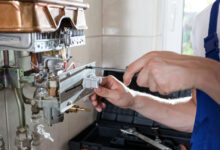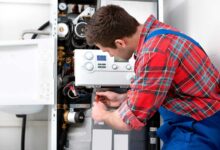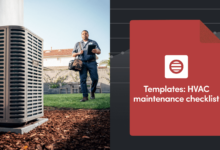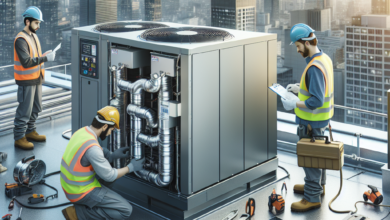Everything You Need to Know About HVAC Maintenance Contract
HVAC Maintenance Contract – Are you tired of dealing with frequent HVAC breakdowns and skyrocketing energy bills? Look no further – an HVAC maintenance contract might be the solution you’ve been searching for. In this comprehensive guide, we will delve into the ins and outs of HVAC maintenance contracts, providing you with all the crucial details you need to make an informed decision. From understanding the benefits to knowing what to expect, we’ve got you covered.
So, what exactly is an HVAC maintenance contract? Simply put, it is a contractual agreement between you and a professional HVAC service provider to ensure regular maintenance and servicing of your heating, ventilation, and air conditioning systems. By signing up for a maintenance contract, you can ensure that your HVAC systems are in top-notch condition year-round, helping you avoid costly repairs and ensuring optimal energy efficiency.
The Importance of HVAC Maintenance
Regular HVAC maintenance is vital for the longevity and efficiency of your heating, ventilation, and air conditioning systems. Neglecting maintenance can lead to a host of issues, including reduced performance, increased energy consumption, and a higher risk of breakdowns. In this section, we will explore the benefits of HVAC maintenance and how it can save you both time and money in the long run.
1. Enhanced Energy Efficiency
One of the primary benefits of regular HVAC maintenance is improved energy efficiency. Over time, dust, dirt, and debris can accumulate in your HVAC system, obstructing airflow and causing it to work harder to maintain the desired temperature. By regularly cleaning and maintaining your system, you can ensure that it operates at peak efficiency, reducing energy consumption and ultimately lowering your utility bills.
2. Prolonged System Lifespan
Another advantage of HVAC maintenance is that it helps extend the lifespan of your system. Just like any other mechanical equipment, regular upkeep ensures that your HVAC system remains in optimal condition. By identifying and addressing potential issues early on, you can prevent major breakdowns and costly repairs, thereby prolonging the life of your system and delaying the need for a replacement.
3. Improved Indoor Air Quality
Indoor air quality is a critical factor for your overall comfort and well-being. Without regular maintenance, your HVAC system can become a breeding ground for harmful bacteria, mold, and allergens, which can circulate throughout your home or office. Routine maintenance, including cleaning and changing filters, helps ensure that the air you breathe is clean, fresh, and free from pollutants, contributing to a healthier living or working environment.
4. Reduced Emergency Repairs
One of the most significant advantages of HVAC maintenance contracts is the potential to avoid unexpected and costly emergency repairs. Regular inspections and maintenance allow technicians to identify and address minor issues before they escalate into major problems. By catching these issues early on, you can prevent sudden breakdowns and the need for emergency repair services, saving you both time and money.
What Does an HVAC Maintenance Contract Cover?
Now that we recognize the significance of HVAC maintenance, let’s explore what a typical maintenance contract entails. In this section, we will provide an in-depth overview of the services and tasks that are generally covered by an HVAC maintenance contract.
1. Regular System Inspections
One of the primary components of an HVAC maintenance contract is regular system inspections. Trained technicians will visit your premises at scheduled intervals to assess the condition of your HVAC system, identify any potential issues, and perform necessary maintenance tasks. This includes inspecting all components, such as the compressor, condenser, evaporator coils, air filters, and electrical connections.
2. Cleaning and Lubrication
Proper cleaning and lubrication are crucial for the smooth operation of your HVAC system. As part of the maintenance contract, technicians will clean various components, including the coils, fan blades, and air filters, removing dirt, dust, and debris that can hinder performance. Additionally, they will lubricate moving parts to reduce friction and ensure optimal functioning.
3. Filter Replacement
Regular filter replacement is essential to maintain good indoor air quality and system efficiency. HVAC maintenance contracts typically include the regular replacement of air filters. Technicians will assess the condition of your filters and replace them as needed to ensure proper airflow and prevent debris buildup.
4. Electrical System Checks
The electrical components of your HVAC system play a crucial role in its operation. As part of the maintenance contract, technicians will inspect electrical connections, measure voltage and current levels, and ensure that all wiring is intact and functioning correctly. This helps identify any potential electrical issues and prevents system malfunctions or safety hazards.
5. Calibration and Testing
To ensure accurate temperature control and optimal performance, HVAC systems require regular calibration and testing. Maintenance contracts often include these tasks, where technicians will check thermostat settings, calibrate controls, and conduct system performance tests to ensure everything is operating as it should.
Different Types of HVAC Maintenance Contracts
Not all HVAC maintenance contracts are created equal. In this section, we will discuss the various types of maintenance contracts available in the market, allowing you to choose the one that best suits your specific requirements and budget.
1. Basic Maintenance Contracts
A basic HVAC maintenance contract typically covers essential services, such as regular inspections, cleaning, and filter replacement. This type of contract is ideal for those on a tighter budget or individuals who prefer to perform some maintenance tasks themselves.
2. Comprehensive Maintenance Contracts
Comprehensive HVAC maintenance contracts offer a more extensive range of services, including not only routine maintenance but also coverage for repairs and replacement parts. These contracts provide a higher level of protection and peace of mind, as they cover a wider range of potential issues that may arise.
3. Customized Maintenance Contracts
For those with specific needs or unique HVAC systems, customized maintenance contracts can be tailored to address individual requirements. This type of contract allows you to select the services that are most relevant to your system, ensuring comprehensive and personalized maintenance coverage.
4. Commercial Maintenance Contracts
Commercial HVAC systems have different requirements compared to residential systems. Commercial maintenance contracts are designed specifically for businesses and cover the maintenance and servicing needs of larger, more complex systems found in commercial buildings, offices, and industrial facilities.
How to Choose the Right HVAC Maintenance Contract
With numerous options available, selecting the perfect HVAC maintenance contract for your needs can be overwhelming. Fear not – in this section, we will guide you through the decision-making process, providing you with valuable tips and considerations to help you make an informed choice.
1. Assess Your Needs
Start by assessing your HVAC system’s specific requirements. Consider factors such as the age of the system, its complexity, and any previous performance issues. This evaluation will help you determine the level of coverage you need and the type of contract that best suits your situation.
2. Research Service Providers
Look for reputable HVAC service providers in your area. Read customer reviews, ask for recommendations from friends or colleagues, and check the company’s credentials and certifications. A reliable and experienced service provider will ensure that your HVAC system is in capable hands.
3. Compare Contracts
Request quotes from multiple service providers and compare their contracts side by side. Pay attention to the services included, contract duration, response time for emergencies, and any exclusions or additional fees. This comparison will help you identify the contract that offers the best value for your investment.
4. Consider Pricing and Payment Options
While cost shouldn’t be the sole determining factor, it is an essential aspect to consider. Evaluate the pricing structure of each contract and assess whether it aligns with your budget. Additionally, inquire about payment options – some providers offer monthly, quarterly, or annual payment plans to suit different financial preferences.
5. Seek Guarantees and Warranties
Ensure that the maintenance contract comes with guarantees and warranties. These provide you with added protection and assurance that the service provider stands behind their work. Look for guarantees on repairs, parts, and overall customer satisfaction.
The Cost of HVAC Maintenance Contracts
One of the most frequently asked questions about HVAC maintenance contracts is, “How much will it cost?” In this section, we will break down the costs associated with HVAC maintenance contracts, helping you understand the financial implications and potential savings.
1. Factors Affecting the Cost
The cost of an HVAC maintenance contract can vary depending on several factors. These may include the level of coverage, the size and complexity of your system, the number of units, and your location. Additionally, the reputation and experience of the service provider can also influence the cost.
2. Long-Term Cost Savings
While HVAC maintenance contracts require an upfront investment, they can lead to significant long-term cost savings. By ensuring that your system operates at peak efficiency, you can reduce energy consumption and lower your utility bills. Moreover, regular maintenance helps prevent major breakdowns that can result in expensive repairs or the need for a complete system replacement.
3. Value of Preventive Maintenance
Consider the value of preventive maintenance compared to reactive repairs. By investingin regular HVAC maintenance, you are taking a proactive approach to caring for your system. This preventive maintenance helps identify and address potential issues before they escalate, saving you from the inconvenience and cost of emergency repairs. It’s like giving your HVAC system a check-up to catch any problems early on and keep it running smoothly.
4. Customization and Pricing Options
When it comes to pricing, HVAC maintenance contracts offer flexibility and customization. Service providers often offer different tiers or levels of contracts to accommodate various budgets and needs. You can choose a contract that aligns with your specific requirements, ensuring you receive the necessary maintenance services at a price that suits your financial situation.
5. Return on Investment (ROI)
Consider an HVAC maintenance contract as an investment rather than an expense. The regular maintenance and care provided through the contract can lead to a higher return on investment in multiple ways. Not only will you experience energy savings and avoid costly repairs, but you’ll also extend the lifespan of your HVAC system, postponing the need for a replacement and saving on the upfront costs associated with purchasing a new system.
The Benefits of Regular HVAC Inspections
Regular inspections are an integral part of any HVAC maintenance contract. In this section, we will explore why these inspections are essential and how they contribute to the overall performance and longevity of your HVAC systems.
1. Early Detection of Issues
During inspections, trained technicians can identify potential issues with your HVAC system before they become major problems. They will carefully examine all components, including electrical connections, refrigerant levels, and airflow, to ensure everything is functioning correctly. By catching issues early on, repairs can be made promptly, preventing further damage or system failure.
2. Improved System Efficiency
Regular inspections help optimize the efficiency of your HVAC system. Technicians will assess the system’s performance, check for any obstructions or leaks, and clean vital components to ensure smooth airflow. By identifying and resolving any efficiency-related issues, inspections contribute to lower energy consumption and reduced utility bills.
3. Enhanced Safety
Safety is a top priority when it comes to HVAC systems. Inspections help identify potential safety hazards, such as faulty wiring or gas leaks, which can pose risks to your home or workplace. Technicians will test safety controls, examine exhaust systems, and ensure proper ventilation, providing you with peace of mind and a secure environment.
4. Compliance with Regulations
Regular inspections help ensure that your HVAC system complies with relevant regulations and codes. Depending on your location, there may be specific requirements for HVAC systems in terms of energy efficiency, emissions, or safety standards. By staying up-to-date with inspections, you can meet these regulations and avoid any penalties or legal issues.
5. Long-Term Cost Savings
Investing in regular inspections as part of an HVAC maintenance contract can lead to long-term cost savings. By addressing minor issues during inspections, you can prevent them from escalating into major problems that require costly repairs or system replacements. Additionally, a well-maintained HVAC system operates efficiently, resulting in lower energy bills over time.
Troubleshooting Common HVAC Problems
Even with regular maintenance, HVAC systems can sometimes encounter issues. In this section, we will discuss some common HVAC problems and provide troubleshooting tips to help you address these issues swiftly and efficiently.
1. Uneven Heating or Cooling
If you notice uneven heating or cooling in different areas of your space, it may indicate a problem with your HVAC system. One possible cause could be blocked or dirty air vents, preventing proper airflow. Check and clean the vents, ensuring they are not obstructed by furniture or other objects. If the issue persists, it may require professional attention to assess the ductwork or balance the system.
2. Strange Noises or Odors
Unusual noises or odors coming from your HVAC system can be indicative of underlying issues. Rattling, banging, or squealing noises may suggest loose or worn-out components. Foul odors could be a sign of mold or bacteria growth. In these cases, it is best to contact a professional HVAC technician to diagnose and resolve the problem.
3. Poor Airflow
If you notice weak or restricted airflow from your vents, it could be due to a clogged air filter. Check the filter and replace it if necessary. Additionally, make sure that the return air registers are not obstructed by furniture or other objects. If the issue persists, it may indicate a more significant problem with the blower motor or ductwork, requiring professional attention.
4. Frequent Cycling On and Off
If your HVAC system frequently cycles on and off, it could be a sign of an underlying issue. The problem may lie in a malfunctioning thermostat, improper sizing of the system, or a refrigerant leak. To troubleshoot, check the thermostat settings and ensure they are correctly programmed. If the issue persists, it is advisable to consult a professional technician to diagnose and repair the problem.
5. High Energy Bills
If your energy bills are unexpectedly high, it may indicate an inefficient HVAC system. Ensure that your air filters are clean and replace them regularly to maintain proper airflow. Check the insulation in your home or workplace to minimize energy loss. If the problem persists, it may be worth considering an HVAC maintenance contract to ensure your system operates at peak efficiency.
DIY HVAC Maintenance Tips
While professional maintenance is crucial, there are also several DIY tasks you can perform to keep your HVAC systems in top shape between service visits. In this section, we will share some helpful tips and tricks to help you maintain your HVAC systems on your own.
1. Regularly Clean and Replace Air Filters
Cleaning or replacing air filters is one of the simplest yet most effective tasks you can do to maintain your HVAC system. Dirty filters restrict airflow and force your system to work harder, leading to increased energy consumption. Check your filters monthly and clean or replace them as needed.
2. Keep Outdoor Units Clear
Ensure that the outdoor unit of your HVAC system is free from debris, such as leaves, dirt, or branches. Clear any obstructions around the unit to allow proper airflow. Trim nearby vegetation to prevent it from encroaching on the unit, which can impede its performance.
3. Clean Vents and Registers
Dust and debris can accumulate in your vents and registers, hindering airflow and reducing system efficiency. Regularly clean these areas using a vacuum or a damp cloth to remove any obstructions and maintain proper airflow throughout your space.
4. Check and Adjust Thermostat Settings
Ensure that your thermostat settings are calibrated correctly to maximize energy efficiency. Consider programming temperature setbacks when the space is unoccupied to reduce unnecessary energy consumption. Additionally, adjusting the temperature by a few degrees can make a noticeable difference in energy savings.
5. Monitor and Control Humidity Levels
Excessive humidity can impact indoor comfort and strain your HVAC system. Use a hygrometer to monitor humidity levels in your space and consider using dehumidifiers or humidifiers to maintain optimal levels. This helps prevent mold growth, improves indoor air quality, and reduces the workload on your HVAC system.
The Importance of Choosing a Reliable HVAC Service Provider
When it comes to HVAC maintenance contracts, the service provider you choose plays a vital role. In this section, we will outline the key factors to consider when selecting an HVAC service provider, ensuring you partner with a reliable and reputable company.
1. Experience and Expertise
Look for HVAC service providers with a proven track record and extensive experience in the industry. An experienced provider is more likely to have a deep understanding of various HVAC systems and the expertise to handle different maintenance and repair tasks efficiently.
2. Licensing and Certifications
Ensure that the service provider holds the necessary licenses and certifications required by your local authorities. These credentials demonstrate their compliance with industry standards and their commitment to delivering quality service. Additionally, certifications from reputable organizations, such as NATE (North American Technician Excellence), indicate technicians’ competence and knowledge.
3. Reputation and References
Check the reputation of the HVAC service provider by reading customer reviews and testimonials. Positive feedback from satisfied customers is a good indicator of the provider’s reliability and professionalism. You can also ask for references or recommendations from friends, family, or colleagues who have previously used their services.
4. Comprehensive Services
Consider the range of services offered by the HVAC service provider. A reliable company should offer not only maintenance contracts but also emergency repairs, system installations, and other HVAC-related services. This ensures that they can cater to your needs at various stages and provide comprehensive care for your HVAC system.
5. Response Time and Availability
Emergencies can happen at any time, so it’s essential to choose a service provider with a prompt response time and availability. Inquire about their emergency service policies, including their response time for urgent repairs. A reliable provider should be accessible and responsive when you need them the most.
Frequently Asked Questions About HVAC Maintenance Contracts
To wrap up our comprehensive guide,we will address some common questions and concerns regarding HVAC maintenance contracts. From contract duration to cancellation policies, we’ve got the answers you’ve been looking for.
1. How long do HVAC maintenance contracts typically last?
The duration of HVAC maintenance contracts can vary depending on the service provider and the type of contract you choose. Some contracts may be annual, while others can span multiple years. It’s important to review the contract terms and determine what works best for your needs and budget.
2. Can I cancel an HVAC maintenance contract if I’m not satisfied?
Most HVAC maintenance contracts come with a cancellation policy. Read the contract terms carefully to understand the cancellation process, including any associated fees or notice periods. It’s advisable to choose a provider that offers a satisfaction guarantee or allows for contract termination if you are not satisfied with their services.
3. What happens if my HVAC system requires repairs that are not covered by the maintenance contract?
While HVAC maintenance contracts typically cover routine maintenance and some repairs, there may be instances where additional repairs are needed. These repairs may fall outside the scope of the contract and may incur additional charges. It’s important to clarify with the service provider which repairs are covered and which are not to avoid any surprises.
4. Can I transfer my HVAC maintenance contract if I move to a new location?
Some HVAC maintenance contracts are transferable, meaning they can be transferred to a new owner or location. This is particularly beneficial if you sell your property or relocate. Check the contract terms to determine if transferability is allowed and if there are any conditions or fees associated with the transfer.
5. Can I upgrade or downgrade my HVAC maintenance contract?
In some cases, you may want to upgrade or downgrade your HVAC maintenance contract based on changing needs or budget constraints. Contact your service provider to discuss the possibility of modifying your contract. They can guide you through the available options and help you make the necessary adjustments.
6. Will HVAC maintenance contracts cover emergency repairs?
While HVAC maintenance contracts primarily focus on preventive maintenance, some contracts may also include coverage for emergency repairs. It’s important to clarify with the service provider whether emergency repairs are included in your contract or if they are offered as an additional service. Understand the response time for emergency repairs and any associated fees.
7. Is it worth investing in an HVAC maintenance contract for a new system?
Yes, investing in an HVAC maintenance contract for a new system is highly recommended. Regular maintenance from the start helps ensure optimal performance, energy efficiency, and longevity of your new system. It can also help detect any manufacturing or installation issues early on, allowing for timely resolution under warranty.
8. Can I perform HVAC maintenance tasks on my own instead of getting a contract?
While there are some HVAC maintenance tasks you can perform on your own, such as regularly cleaning or replacing air filters, it’s still advisable to have a professional HVAC technician perform comprehensive maintenance. They have the expertise, specialized tools, and knowledge to identify and address potential issues that may not be apparent to an untrained eye.
9. Are there any tax benefits or incentives for having an HVAC maintenance contract?
Depending on your location, there may be tax benefits or incentives available for having an HVAC maintenance contract. These incentives can vary, so it’s advisable to check with local authorities, energy efficiency programs, or tax professionals to determine if you qualify for any savings or benefits.
10. How often should I schedule maintenance visits under the contract?
The frequency of maintenance visits will depend on your specific HVAC system, usage patterns, and the recommendations of your service provider. Typically, bi-annual maintenance visits are recommended – once before the cooling season and once before the heating season. However, some systems may require more frequent visits. Consult with your service provider to determine the optimal maintenance schedule for your HVAC system.
In conclusion, investing in an HVAC maintenance contract can provide you with peace of mind, enhanced energy efficiency, and significant cost savings in the long run. By understanding the importance of regular maintenance, selecting the right contract, and partnering with a reliable service provider, you can ensure your HVAC systems operate at their best for years to come.









